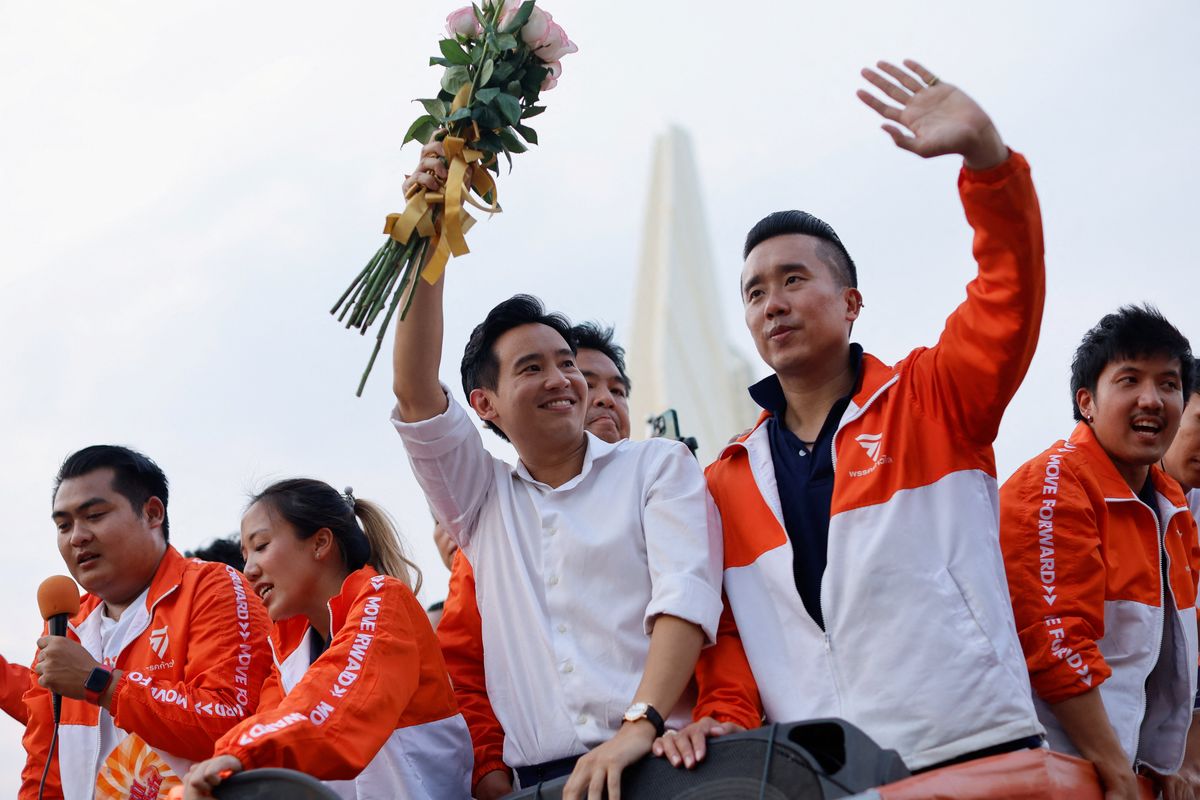On Sunday, Thai voters shocked the ruling pro-military establishment by delivering a landslide victory for the democratic opposition. Okay, so that means the generals are out, right?
Nope.
For one thing, the men in uniform pre-rigged the election. After taking over in a 2014 coup, they rewrote the constitution to appoint the entire 250-member Senate, which picks the prime minister along with 500 MPs elected by popular vote. To form a government without the army’s consent, you need a majority of at least 376 seats, equivalent to three-quarters of the lower chamber.
Thailand’s military, with a long and rather successful history of intervening in politics, did this to ensure they would still call the shots no matter how their coalition performed at the ballot box. (Even before tweaking the charter, the country’s fragmented parliament and weak party system made it difficult for any party to win an outright majority.)
Regardless, the frontrunner for PM is 42-year-old Pita Limjaroenrat, a telegenic, English-speaking businessman whose progressive Move Forward Party got the most votes and seats. Against all odds, MFP bested the Pheu Thai (For Thais) Party backed by exiled former PM Thaksin Shinawatra, whose parties had won every single Thai election since he swept to power in 2001.
MFP and Pheu Thai — now captained by Thaksin’s millennial daughter, Paetongtarn — quickly announced a six-party coalition to form a government. But together they only have 309 seats, 67 shy of the minimum threshold to override the army’s likely Senate veto.
To get that supermajority, the opposition might reach out to an unlikely kingmaker: the Bhumjaithai or “Thai Pride Party,” which came in third with 71 MPs. Bhumjaithai’s claim to fame is having led the charge for Thailand to legalize recreational cannabis, which the government actually did last year despite the country being famous for its very tough anti-drug laws.
Unfortunately, being pro-weed puts Bhumjaithai at odds with Pheu Thai, whose socially conservative rural base hates stoners and supported Thaksin’s bloody war on drugs in the early 2000s. Similarly, Bhumjaithai is also an establishment royalist party that won’t allow MFP to reform Thailand’s draconian lèse-majesté laws, popularly known as “112” for the article in the criminal code that punishes offenses to the king with up to 15 years behind bars.
What’s more, even if these three parties cut a deal, a very big if, the generals won’t leave without putting up a (political) fight.
The Thai army has ways to hold onto power despite losing big in the election. Its political allies could seek to dissolve MFP on bogus election law violation charges, as they did with its predecessor, Future Forward. (That disqualification triggered the 2020-2021 youth-led protests that rocked Thailand and turned out many first-time voters to back MFP.)
And if that doesn’t pan out, the generals might try to use the judiciary to remove the premier on even more ludicrous grounds. After all, the constitutional court once fried a sitting PM for … hosting a cooking show.
Still, if the generals pull a fast one, there could be major trouble ahead. How would you feel if you voted for change, yet got more of the same?
If anything is certain in Thai politics, it’s that violent street protests are sooner or later followed by a military coup, with the king’s blessing of course. And that’ll plunge the Land of Smiles deeper into political Groundhog Day.


















